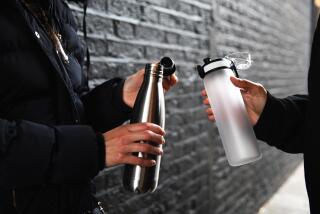It’s Elemental: Lots of Water Adds Up to Good Health
- Share via
Since I was in the neighborhood on an errand, I decided to visit the studio where my husband, Steve, takes his Spinning class. As soon as I walked in and saw a dozen people pedaling like crazy on stationary bikes, I was struck by one thing: sweat. Buckets of it. There wasn’t a dry patch of skin in the room. No wonder someone was always reaching for a water bottle.
Gone are the days when conventional wisdom held that drinking while exercising was bad for you. Thank goodness, most people now understand that they must replenish fluids lost through perspiration. And according to polls, people also seem to accept that they should consume about two liters of hydrating fluids a day. So why do only about half of all Americans actually drink that much? Maybe they just don’t realize how much good water does in our bodies or the potential dangers of not drinking enough.
A component of every cell, water comprises 55% to 60% of our body weight. We can survive three months without food, but only a few days without water, which carries nutrients from the digestive system to all cells in the body, as well as cellular waste products to the kidneys so that they can be excreted in urine. Water serves as the solution in which all nutrients are dissolved and as a “shock absorber” inside the eyes and spinal cord. It lubricates and cushions around joints and, through perspiration, regulates our body’s temperature.
When we stay properly hydrated, we have more energy, an improved sense of well-being, greater stamina and endurance during physical activity, and better digestion and elimination (one of the most common causes of constipation is dehydration). Good hydration also tends to reduce overeating, since people often grab something to eat when they actually need something to drink.
When the body doesn’t get enough water, dehydration occurs. Symptoms of dehydration can be reasonably benign, like dry, itchy skin and fatigue. Or they can be far more serious, ranging from poor concentration and headaches to blurred vision and lack of neuromuscular control. In the long term, chronic underhydration can lead to severe problems that affect blood pressure, circulation, digestion and kidney function.
Now, while it’s true that most fluids contribute to your overall fluid intake, water is far and away the optimum source. Soft drinks and lemonade, for example, have other stuff in them, like sugar, that you probably want to avoid in high quantities. Caffeinated and alcoholic beverages can interfere with hydration, or even cause dehydration, because of their diuretic properties: They cause the body to lose water through increased urination. Interestingly, having to urinate more frequently is one of the excuses I most often hear from people for not drinking more water--and yet, some of these people are moderate to heavy coffee drinkers.
Another common excuse for not drinking more liquid is, “I’m not thirsty.” But thirst is not an adequate measure of how much water the body needs. Those who sweat heavily will dehydrate faster than their bodies’ thirst reflex can signal the need for more liquid. This applies especially to children and the elderly.
Staying hydrated when you’re physically active is especially important. To give you an idea why, weigh yourself before you start exercising. Then, after you finish, weigh yourself again. Every pound lost during your workout represents 16 fluid ounces. It’s easy to lose one to three pounds of water weight--or more--every time you exercise. That day I watched Steve’s Spinning class, I could have wrung a full cup of liquid from his shirt, which looked as though he’d worn it in the shower. It was obvious that he (and his classmates) needed rehydration.
Someone who swims for exercise, and isn’t aware of perspiring, also has to stay hydrated. As does the softball player and cyclist and jogger--even if their shirts are bone dry. Remember that fresh air and breezes can quickly evaporate body moisture and mislead you into believing that you’re not losing liquid.
As active as I am, I’ve developed a kind of hydration routine that fits pretty seamlessly into my daily life. By following it, I know my body won’t be underhydrated. In addition to keeping a bottle of water on my desk when I work or next to me when I drive, I drink several 12-ounce glasses of water a day: As soon as I wake up; before, during and after working out; whenever I’m feeling low on energy or having trouble concentrating; while I’m making dinner; and before bed. If I get tired of the taste of water, I’ll flavor it with a little fruit juice or make some herbal tea, either hot or chilled.
True, I have to visit the bathroom more often than most people. But to my way of thinking, that’s part of the routine. All that extra walking is, well, exercise.
Copyright 1998 by Kathy Smith
* Kathy Smith’s fitness column appears weekly in Health. Reader questions are welcome and can be sent to Kathy Smith, Health, Los Angeles Times, Times Mirror Square, Los Angeles, CA 90053. If your question is selected, you will receive a free copy of her book “Getting Better All the Time.” Please include your name, address and a daytime phone number with your question.


